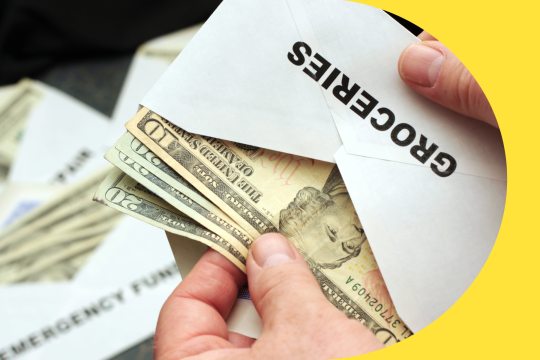No matter how you eat, food is a pillar of everyday life. Which is why it’s probably a big part of your budget, too.
But with some smart strategies and a bit of planning, you can discover how to save on grocery bills, prepare meals more frugally at home, and even spend less when eating out. Students, newlyweds, retirees, and families on a budget have been doing it for generations. In fact, saving on food can do wonders for your financial planning and may be easier than you think when you find what works for you.
13 ways to save on groceries
Wondering how to save money on groceries? Consider these 13 easy tips and tricks:
1. Make a list. Plan your grocery shopping in advance by creating a list of the items you need. Stick to the list to help you avoid impulsive purchases.
2. Use coupons and discounts. Watch out for coupons in newspapers, online, and through store apps. Use digital coupons and discount codes to get prices lower and help guide your meal planning.
3. Buy generic brands. Opt for store or generic brands rather than name brands. Generic products usually offer similar quality goods at lower costs. Think bagged cereals and store-brand “dupes” of popular boxed meals, pastas, deli items, and canned goods.
4. Join loyalty programs. Sign up for loyalty programs offered by your favorite grocery stores. These programs offer exclusive discounts, rewards, and cashback offers, often helping you save money right away and in the long run.
5. Never shop while hungry. Research reveals shopping on an empty stomach can lead to impulsive and unnecessary purchases. To make more mindful choices, eat before your food shop. (You’ll be in less of a rush, too.)
6. Use a calculator. If a product is sold in various sizes or quantities, calculate the cost per unit on your phone to compare the best value between products. The differences can be big. And buying in bulk is often your most cost-effective move.
7. Buy seasonal produce. Seasonal fruits and vegetables aren’t just tastier and better for the environment; they’re also priced to move while they’re fresh. What’s not to like?
8. Pick frozen and canned foods when buying out-of-season items. Frozen and canned foods are typically just as nutritious as fresh produce but can be much lower-priced. Stock up on canned goods and frozen vegetables and fruits to extend their shelf life and reduce waste. (You can also opt for dried spices over fresh ones for significant savings.)
9. Cut down on convenience foods. Pre-packaged snacks and deli-prepared meals may save time, but you’ll likely pay a much higher price tag, even if the individual price is low. Opt for whole ingredients, like blocks of cheese instead of pre-shredded cheese.
10. Use cash. Using cash instead of credit or debit cards for groceries will help you stick to your budget and be more conscious of your spending.
11. Buy in bulk. Mentioned above, but especially for non-perishable items like rice, pasta, and canned goods, buying in bulk can save you significant money. Just make sure you have enough storage at home.
12. Watch sell-by dates. If you have to splurge on a birthday cake or another expensive bakery item, scan the selection for something approaching its sell-by date. These items can be marked down by 50% or more. Many grocery store bakeries have a dedicated shelf for such treats, with the discounts clearly marked.
13. Go veg. Even if it’s just a day or two a week, lowering the amount of meat you eat can save significantly on groceries. Meat is typically much more expensive than other protein sources like beans and cheese. It’s also not a bad idea for your health and the environment’s.
5 ways to save at meal prep
Curious about how to meal prep on a budget? Consider these five simple tips:
1. Pick versatile ingredients. Reach for inexpensive, flexible ingredients that can be used to cook whatever you’re in the mood for. Broccoli, potatoes, onions, bell peppers, black beans, and tomatoes can be used in countless recipes — from stir-frys and bowls to tacos and soups — and they’re all relatively cheap. By focusing on versatile ingredients, you can buy in larger quantities and easily round out your recipes.
2. Recipes first. Plan your meals before you write your grocery list, and then base the list on those recipes. Knowing exactly what you need for each meal helps prevent impulse buys, minimize food waste, and schedule your meals. Stick to the list when shopping to stay on budget and keep your meals on track.
3. Favor inexpensive recipes. Prep large portions of homemade soups, stews, stir-frys, and rice or bean dishes. Any of these can be nutritious and filling, with a low per-meal cost. You can also add different low-cost sides or add-ons to keep each meal interesting, whether it’s a salad or another ingredient that matches your base meal.
4. Batch cooking. Consider cooking an extra-large meal and then bringing leftovers to work or on the go. This lowers your per-meal costs while helping you avoid eating out just because you’re out of the house.
5. Make your own freezer meals. Cooking an extra-large version of a recipe and freezing the leftovers in meal-size containers helps stretch your meals even further. The next time you find yourself too tired to cook (i.e. tempted to order takeout), you’ll have a great alternative waiting for you in the freezer.
5 ways to save at restaurants
Eating out on a budget? You could save money by following these five easy tricks:
1. Use promo codes. Many restaurants offer promotional codes or discounts through their websites, social media, or dining apps. Before heading out, check for deals or special offers that can help you save on your meal.
2. Pay in cash. When you pay with cash, you can better control your spending and avoid extra charges. Plus, leaving your credit card at home reduces the temptation to overspend on extras.
3. Order appetizers or side dishes — not entrees. Instead of an expensive entree, consider ordering a few side dishes or an appetizer. Side dishes are often cheaper and just as satisfying. You can always order more later if you’re still hungry, but you can never order less later.
4. Happy hour is your friend. If the restaurant offers a happy hour menu, schedule accordingly for a nearly identical experience at a fraction of the price.
5. Split large portions. Many restaurants serve generous portions. Ask anyone you’re dining with if they’d like to split something. And if it’s still more than you bargained for, ask for that to-go box.
The road to healthy finances
As you can see, saving money on food doesn't have to mean sacrificing taste, quality, or even portion sizes. You can eat well without overspending with just a bit of forethought.
And when you use EarnIn’s Cash Out tool, you’ll have even more flexibility to buy what you want, when you want, whether it’s fresh produce deals, bulk buys, or any other opportunities life sends your way before payday. The user-friendly EarnIn app lets you access your pay as you work, so you can handle expenses and build a stronger financial future at your speed, not your paycheck’s.
Download EarnIn now and start your journey toward smarter spending and all the financial goals that follow.
Disclaimer: Please note, the material collected in this post is for informational purposes only and is not intended to be relied upon as or construed as advice regarding any specific circumstances. Nor is it an endorsement of any organization or services.
You may enjoy












EarnIn is a financial technology company not a bank. Subject to your available earnings, Daily Max and Pay Period Max. EarnIn does not charge interest on Cash Outs. EarnIn does not charge hidden fees for use of its services. Restrictions and/or third party fees may apply. EarnIn services may not be available in all states. For more info visit earnin.com/TOS.






